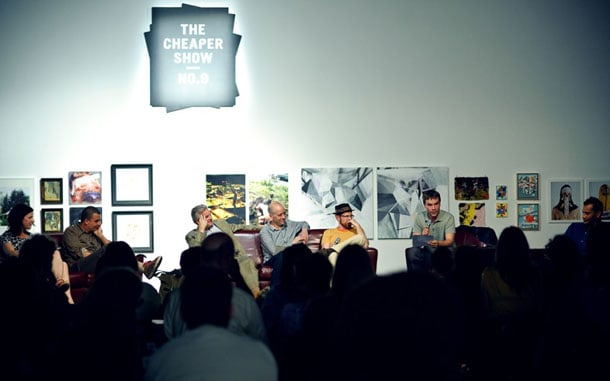Victor Wang makes and curates art in Vancouver, but don't get the idea that's an easy thing to do. "The thing about art," he said, is that "to buy art, and for people to find artists, it's kind of difficult in this city unless you're in the art industry."
The sentiments of Wang reflect tough realities for artists these days. Until this year, many of them received financial support in the form of grants funded by provincial gambling proceeds.
Last March, however, the cash-strapped B.C. government announced it had new priorities for the grants, opting to fund organizations that "assist public safety, youth and disabled sports, people in need, fairs, festivals and museums, community services such as preschools," as well as parent advisory councils.
The non-profit model that a number of artists and arts organizations relied on abruptly ended.
Now what? That's what Wang wanted to know, so he invited a slew of prominent B.C. artists and arts organizers to join his Make Art History symposium, held at the end of June.
The event attracted a crowd of artists weary of defending who they are and what they do to a government that seems unwilling to listen.
While the aim of the symposium was to "address the sustainability of our art system and the need for the development of new emerging artist economies," the conversation quickly turned into a passionate defence of a community that's had to repeatedly prove itself and its need for support.
As other arts groups received similar news across the province, The Tyee followed up with the Make Art History panelists to hear their thoughts on funding models old and new, as well as the search for those not yet imagined.
'Yanked away'
Vancouver-based artist and writer Kate Armstrong, who recently curated Group Show, an exhibition for the Vancouver Olympics, told The Tyee that organizations with funding models heavily reliant on gaming grants will soon find themselves in need of a makeover.
"[They've] been encouraged all these years to become structured as a non-profit organization, to not be driven by the market," Armstrong said.
"All of these things put forward a certain approach to how exhibitions are made, and then when the support for that model is totally yanked away, they don't have a way to support that model because it was deliberately non-commercial."
Bruce Haden, architect and former board president of Vancouver's Contemporary Art Gallery, says there are other aspects of the gaming model that are problematic. According to him, government funding tends to favour organizations that have a durability or history in the system.
"If we want to encourage innovation, we actually have to accept that a granting process can't be exclusively dependent on track record, because then we never get anybody new in the system," Haden said.
To the panelists, calling on the cash-strapped B.C. government to prioritize arts means once again having to prove their worth.
"The frustration that most of us who care about the arts feel is pretty deep," said Haden. "But you have to say, the game we're playing hasn't worked. What other options are there?"
'We're considered totally expendable'
To some, the loss of the gaming grants represents yet another slight to the province's cultural sphere, and the need to reestablish arts as fundamental and a worthy recipient of sparse funds emerged as a major talking point.
"We have a siege mentality," said Marcus Youssef, artistic producer at Vancouver's Neworld Theatre. "Singularly, among all jurisdictions in Canada, we're considered by this government to be totally expendable. That's not the case in Ontario, Quebec. That's not the case in Saskatchewan."
Amir Ali Alibhai, executive director of the Alliance for Arts and Culture, says that the B.C. arts community is no stranger to having to justify its place in the world.
However, he said, the politics are not getting any easier.
"We're starting to see something a little bit scary, and that is an ideological interference of government in public funding," he said. "We need to be better as a community in communicating how we operate and what we do."
After the symposium, Alibhai said he was pleased with the conversation, but for him, defending the arts in B.C. is nothing new.
"It made me realize we need to say some of the same things again," he said.
'Building a market'
Although the panelists had much to say on the importance of cultural investment in the province, the future of arts funding is less certain.
Haden says that while the art scene won't disappear, it's likely that private money will have to step up to the plate.
Armstrong points to contemporary memes like crowd-sourcing -- allowing audiences to choose the projects or organizations they wish to support -- as a possible approach to the funding problem. It's an experimental model, she says, and having audiences pick and choose which projects they want to micro-finance has certain limitations.
"There's this sense that sometimes the public doesn't know what they don't know, or what would be good to develop and see," said Armstrong. "It seems to me the galleries do a lot of heavy lifting culturally, and sometimes [the exhibits] are not going to be all that commercial."
A market-driven model, which is more about selling emergent talent than gallery chin-stroking, presents another opportunity for B.C. artists to promote themselves.
One example? The Cheaper Show: a hectic one-night-only art sale in downtown Vancouver. Each of the 400 pieces at the show costs $200, with the goal of building and stimulating a market for emerging collectors and artists.
"Somehow they've tapped into this huge audience, and these numbers are unheard of in any other kind of structure, at least locally, in terms of building a market for all these new circles of patronage," Armstrong said.
Hybrid mix
While most have given up on the reinstating of government gaming grants, the panelists didn't necessarily encourage artists to go rogue.
"I think complex and evolving ecosystems of cultural production need complex and evolving systems of investment," said Armstrong, who advocates for a hybrid model of government and commercial funding.
"Longstanding institutions are necessary and should be treated as an important part of our heritage and landscape and history," she added. "New platforms should be supported by government and private bodies with the same vigorous excitement we see them having around technology or experimental financial instruments."
Vancouver-based artist Keith Higgins just started a small publishing venture that, for lack of a better model, will be set up as a sole proprietorship.
The history of arts survival is all about taking risks, he says, and the "great ecology of arts organizations" gives him faith that by working together, arts organizations will endure the cuts.
"We can certainly communicate better among ourselves, but the crux of the problem is that artists do not have power," Higgins said.
"Overall, it is about power. It's about not feeling that we have to be on the margins, that we have no right to represent ourselves, or that we lack legitimacy because there are a whole bunch of people worse off than we are."
'We'll push it to the limit'
This year Victoria's Fringe festival was denied a $42,500 gaming grant and told in a letter from the province that it "did not reflect the regional or cultural characteristics of a community."
That prompted festival manager Ian Case to blast the provincial government for its "stunning ignorance" of what the festival brings to the community.
The Vancouver International Fringe Festival, meanwhile, is still coasting on a three year grant of gambling revenue that the government promised to honour. But executive director David Jordan says that agreement runs out in 2012, and he is starting to look at alternative sources of funding for his organization.
"I don't think we're going to reinvent the wheel," Jordan said. "We've always been so flexible and adaptable, with lightweight administration, but we'll push it to the limit. We'll probably have to go with fewer main stage venues, and more of what we call bring-your-own-venues."
"It's not entirely clear to what extent we'll have to adapt," he said. ![]()
Read more: Politics
















Tyee Commenting Guidelines
Comments that violate guidelines risk being deleted, and violations may result in a temporary or permanent user ban. Maintain the spirit of good conversation to stay in the discussion.
*Please note The Tyee is not a forum for spreading misinformation about COVID-19, denying its existence or minimizing its risk to public health.
Do:
Do not: